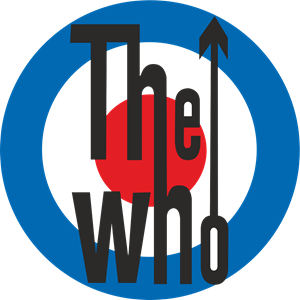After John Entwistle: Tours and Endless Wire
John Entwistle's son, Christopher, gave a statement supporting the Who's decision to carry on. The US tour began at the Hollywood Bowl with touring bassist Pino Palladino. Pete Townshend dedicated the show to Entwistle, and ended with a montage of pictures of him. The tour lasted until September. The loss of a founding member of the Who caused Pete Townshend to re-evaluate his relationship with Roger Daltrey, which had been strained over the band's career.
He decided their friendship was important, and this ultimately led to writing and recording new material. To combat bootlegging, in 2002 the band began to release the Encore Series of official soundboard recordings via themusic.com. An official statement read: "to satisfy this demand they have agreed to release their own official recordings to benefit worthy causes". In 2004, the Who released "Old Red Wine" and "Real Good Looking Boy"
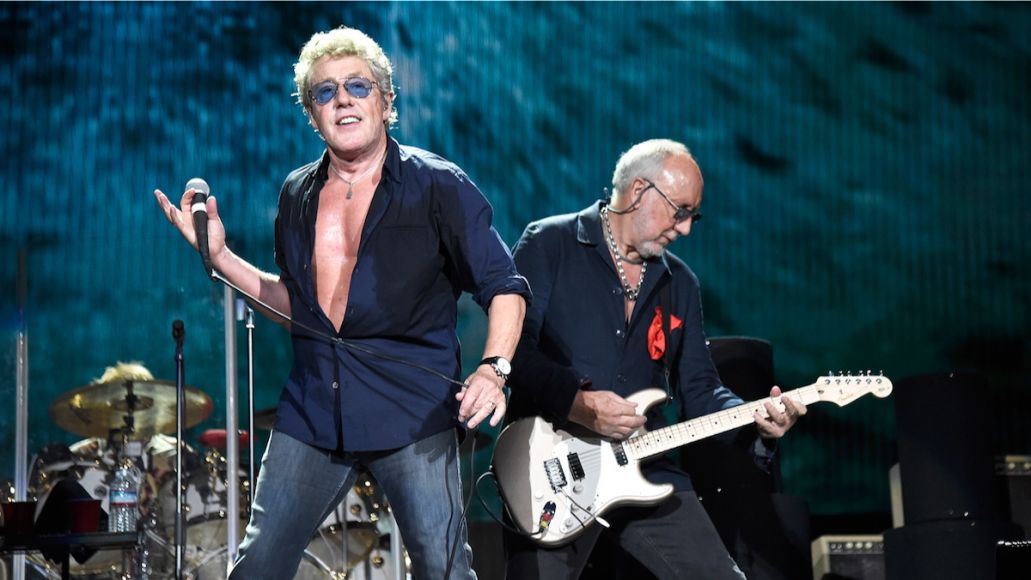
(with Pino Palladino and Greg Lake, respectively, on bass) on a singles anthology, The Who: Then and Now, and went on an 18-date tour of Japan, Australia, the UK and the US, including a return appearance at the Isle of Wight. Later that year, Rolling Stone ranked the Who No. 29 on their list of the 100 Greatest Artists of All Time. The Who announced in 2005 that they were working on a new album. Pete Townshend posted a novella called The Boy Who Heard Music on his blog, which developed into a mini-opera called Wire & Glass, forming the basis for the album. Endless Wire, released in 2006, was the first full studio album of new material since 1982's It's Hard and contained the band's first mini-opera since "Rael" in 1967. The album reached No. 7 in the US and No. 9 in the UK. Zak Starkey was invited to join Oasis in April 2006 and the Who in November 2006, but he declined and split his time between the two.
In November 2007, the documentary Amazing Journey: The Story of The Who was released, featuring unreleased footage of the 1970 Leeds appearance and a 1964 performance at the Railway Hotel when the group were The High Numbers. Amazing Journey was nominated for a 2009 Grammy Award. The Who toured in support of Endless Wire, including the BBC Electric Proms at the Roundhouse in London in 2006, headlining the 2007 Glastonbury Festival, a half-time appearance at the Super Bowl XLIV in 2010 and being the final act at the closing ceremony of the London 2012 Olympic Games. In November 2012, the Who released Live at Hull, an album of the band's performance the night after the Live at Leeds gig.
Quadrophenia and More
In 2010, the Who performed Quadrophenia with parts played by Eddie Vedder and Tom Meighan at the Royal Albert Hall as part of the Teenage Cancer Trust series of 10 gigs. A planned tour for early 2010 was jeopardised by the return of Pete Townshend's tinnitus. He experimented with an in-ear monitoring system that was recommended by Neil Young and his audiologist.
The Quadrophenia and More tour started in November 2012 in Ottawa with keyboardists John Corey, Loren Gold and Frank Simes, the last of whom was also musical director. In February 2013, Zak Starkey pulled a tendon and was replaced for a gig by Scott Devours, who performed with less than four hours' notice. The tour moved to Europe and the UK, and ended at the Wembley Arena in July 2013.
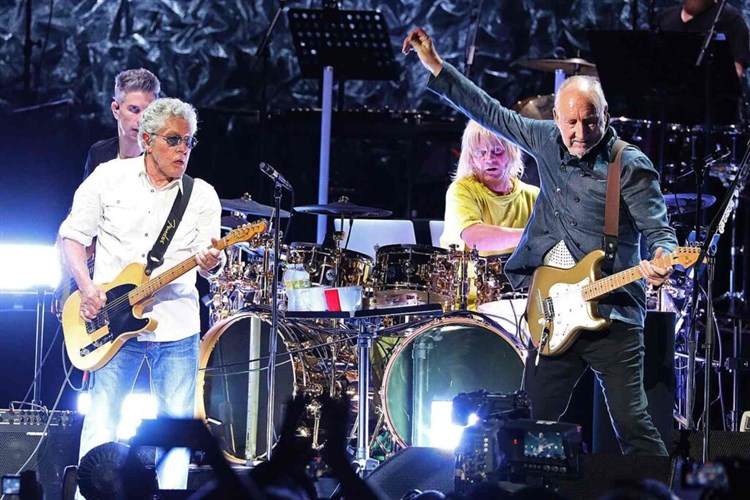
The Who Hits 50! and beyond
In October 2013, Pete Townshend announced the Who would stage their final tour in 2015, performing in locations they have never played before. Roger Daltrey clarified that the tour was unrelated to the band's 50th anniversary and indicated that he and Pete Townshend were considering recording new material. Roger Daltrey stated, "We can't go on touring forever ... it could be open-ended, but it will have a finality to it."
Kenney Jones reunited with the Who in June 2014 at a charity gig for Prostate Cancer UK his Hurtwood Polo Club, alongside Jeff Beck, Procol Harum and Mike Rutherford. Later that month, the Who announced plans for a world tour with a possible accompanying album. In September, the Who released the song "Be Lucky", which was included on the compilation The Who Hits 50! in October. That November, the group released a virtual reality app co-designed by Roger Daltrey's son, Jamie, featuring events and images from the band's history.
The Who headlined 2015's Hyde Park Festival in June, and two days later, the Glastonbury Festival. Pete Townshend suggested to Mojo that it could be the group's last UK gig. To coincide with The Who's 50th anniversary, all studio albums, including the new compilation, The Who Hits 50!, were reissued on vinyl. In September 2015, all remaining US tour dates were cancelled after Roger Daltrey contracted viral meningitis. Then Pete Townshend promised the band would come back "stronger than ever".
The Who embarked on the Back to the Who Tour 51! tour in 2016, a continuation of the previous year's tour. This included a return visit to the Isle of Wight Festival (at the Seaclose Park in Newport) on June 11, opening date. After 13 concerts, it concluded with a performance at the Desert Trip festival at the Empire Polo Club in Indio, California, on October 16. In November, The Who announced that five UK dates the following April (previously scheduled for that August and September) would include a full live performance of Tommy. The five-date tour was renamed "2017 Tommy & More" and included the largest selections from the album since 1989. Two preliminary concerts at the Royal Albert Hall for the Teenage Cancer Trust on March 30, and April 1, featured Tommy in full.
In January 2019, the band announced the Moving On! tour. The tour began on May 7 in Grand Rapids, Michigan, but was interrupted during a show in Houston, Texas on September 26, 2019 after Roger Daltrey lost his voice. The COVID-19 pandemic put the remainder of the tour on hold.
On December 6, 2019, The Who released their first studio album in thirteen years, Who, to critical acclaim.
The Who Hits Back
In February 2022, the band announced they would embark on April 22, 2022 in Hollywood, Florida on a new North American tour entitled "The Who Hits Back" due to conclude on November 5, 2022 in Las Vegas, Nevada.
Musical style and equipment
The Who have been regarded primarily as a Rock band, yet have taken influence from several other styles of music during their career. The original group played a mixture of trad jazz and contemporary pop hits as The Detours, and R&B in 1963. The group moved to a Mod sound the following year, particularly after hearing the Small Faces fuse Motown with a harsher R&B sound.
The group's early work was geared towards singles, though it was not straightforward pop. In 1967, Pete Townshend coined the term "Power pop" to describe the Who's style. Like their contemporaries, the group were influenced by the arrival of Jimi Hendrix, particularly after the Who and the Experience met at the Monterey International Pop festival. This and lengthy touring strengthened the band's sound. In the studio, they began to develop softer pieces, particularly from Tommy onwards, and turned their attention towards albums more than singles. From the early 1970s, the band's sound included synthesizers, particularly on Who's Next and Quadrophenia. Although groups had used synthesizers before, the Who were one of the first to integrate the sound into a basic rock structure.
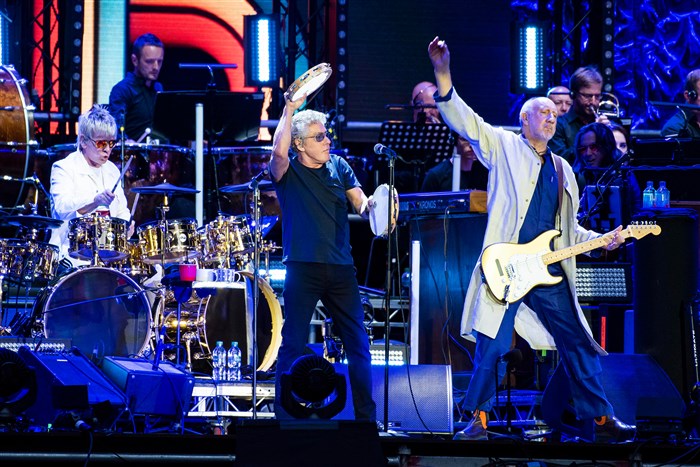
In The Who By Numbers the group's style had scaled back to more standard rock, but synthesisers regained prominence on Face Dances.
Pete Townshend and John Entwistle were instrumental in making extreme volumes and distortion standard rock practices. The Who were early adopters of Marshall Amplification. John Entwistle was the first member to get two 4×12 speaker cabinets, quickly followed by Pete Townshend. The group used feedback as part of their guitar sound, both live and in the studio. In 1967, Pete Townshend changed to using Sound City amplifiers, customised by Dave Reeves, then in 1970 to Hiwatt. The group were the first to use 1000-watt PA systems for live gigs, which led to competition from bands such as The Rolling Stones and Pink Floyd.
Throughout their careers, the members of The Who have said their live sound has never been captured as they wished on record. Live gigs and the audience have always been important to the group. "Irish" Jack Lyons said, "The Who weren't a joke, they were fucking real, and so were we."
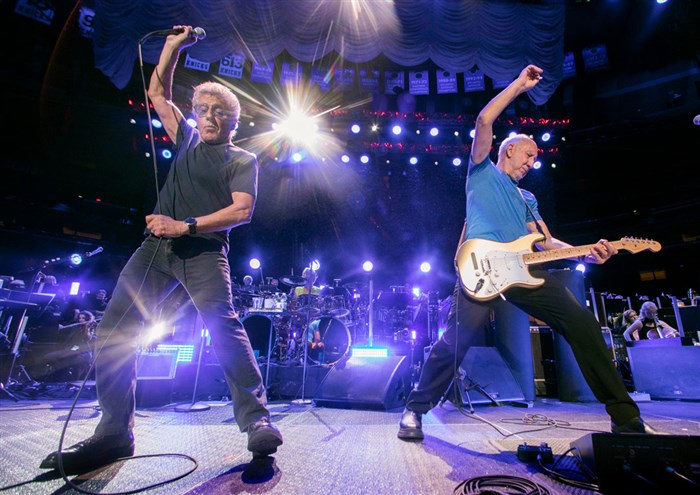
Vocals
Roger Daltrey initially based his style on Motown and Rock and roll, but from Tommy onwards he tackled a wider range of styles. His trademark sound with the band, as noted in 1983, has been a characteristic scream, as heard at the end of "Won't Get Fooled Again". Group backing vocals are prominent in the Who. After "I Can't Explain" used session men for backing vocals, Pete Townshend and John Entwistle resolved to do better themselves on subsequent releases, producing strong backing harmonies.
Roger Daltrey, Pete Townshend and John Entwistle sang lead on various songs, and occasionally Keith Moon joined in. Who's Next featured Roger Daltrey and Pete Townshend sharing the lead vocals on several songs, and biographer Dave Marsh considers the contrast between Roger Daltrey's strong, guttural tone and Pete Townshend's higher and gentler sound to be one of the album's highlights. Roger Daltrey's voice is negatively affected by marijuana smoke, to which he says he is allergic. On May 20, 2015, during a Who concert at Nassau Coliseum, he smelled a joint burning and told the smoker to put it out or "the show will be over". The fan obliged, without taking Pete Townshend's advice that "the quickest way" to extinguish a joint is "up your fucking arse".
Guitars
Pete Townshend considered himself less technical than guitarists such as Eric Clapton and Jeff Beck and wanted to stand out visually instead. His playing style evolved from the banjo, favouring down strokes and using a combination of the plectrum and fingerpicking. His rhythm playing frequently used seventh chords and suspended fourths, and he is associated with the power chord, an easy-to-finger chord built from the root and fifth that has since become a fundamental part of the rock guitar vocabulary. Pete Townshend also produced noises by manipulating controls on his guitar and by allowing the instrument to feedback.
In the group's early career, Pete Townshend favoured Rickenbacker guitars as they allowed him to fret rhythm guitar chords easily and move the neck back and forwards to create vibrato. From 1968 to 1973, he favoured a Gibson SG Special live, and later used customised Les Pauls in different tunings.
In the studio for Who's Next and thereafter, Pete Townshend used a 1959 Gretsch 6120 Chet Atkins hollow-body guitar, a Fender Bandmaster amp and an Edwards volume pedal, all gifts from Joe Walsh. Pete Townshend started his career with an acoustic guitar and has regularly recorded and written with a Gibson J-200.
Drums
Keith Moon further strengthened the reversal of traditional Rock instrumentation by playing lead parts on his drums. His style was at odds with British rock contemporaries such as The Kinks' Mick Avory and The Shadows' Brian Bennett who did not consider Tom-toms necessary for rock music. Keith Moon used Premier kits starting in 1966. He avoided the hi-hat, and concentrated on a mix of tom rolls and cymbals.
Kenney Jones' drumming style was in sharp contrast to Keith Moon's. The Who were initially enthusiastic about working with a completely different drummer, though Pete Townshend later stated, "we've never really been able to replace Keith." Zak Starkey knew Keith Moon from childhood and Keith Moon gave him his first drum kit. Zak Starkey has been praised for his playing style which echoes Keith Moon's without being a copy.
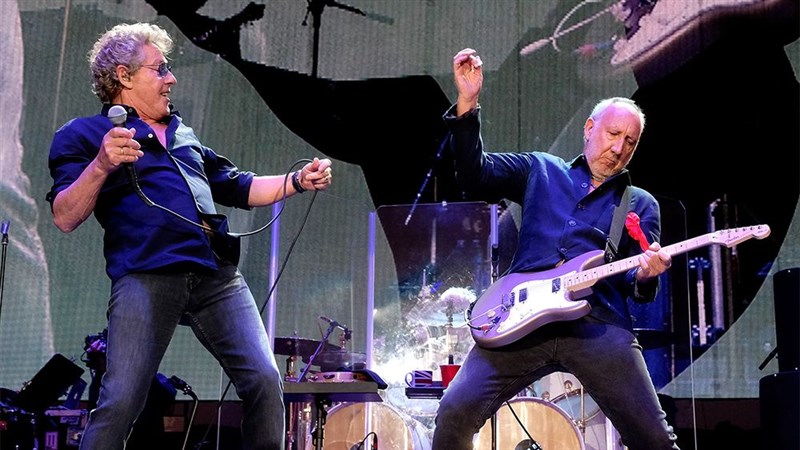
Bass
A distinctive part of the original band's sound was John Entwistle's lead bass playing, while Pete Townshend concentrated on rhythm and chords. John Entwistle's was the first popular use of Rotosound strings in 1966, trying to find a piano-like sound. His bassline on "Pinball Wizard" was described by Who biographer John Atkins as "a contribution of its own without diminishing the guitar lines"; he described his part on "The Real Me" from Quadrophenia, recorded in one take, as "a bass solo with vocals". John Entwistle's basses include a "Frankenstein" assembled from five Fender Precision and Jazz basses, and Warwick, Alembic, Gretsch and Guild basses.
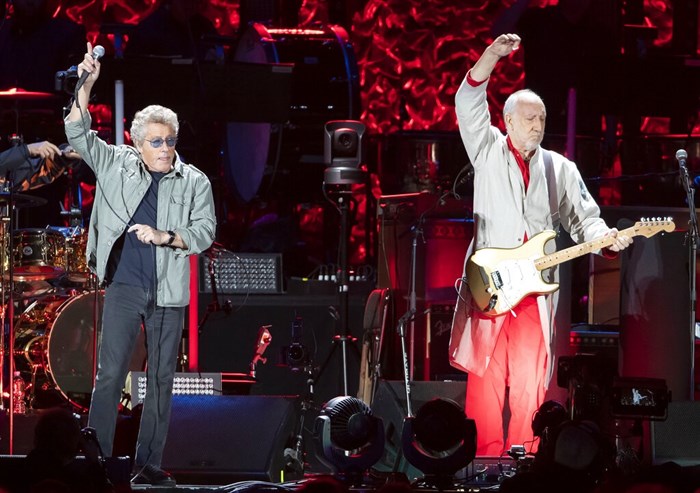
Songwriting
Pete Townshend focused on writing meaningful lyrics inspired by Bob Dylan, whose words dealt with subjects other than boy–girl relationships that were common in Rock music; in contrast to Bob Dylan's intellectualism, Pete Townshend believed his lyrics should be about things kids could relate to.
Early material focused on the frustration and anxiety shared by Mod audiences, which Pete Townshend said was a result of "searching for [his] niche". By The Who Sell Out, he began to work narrative and characters into songs, which he fully developed by Tommy, including spiritual themes influenced by Meher Baba. From the mid-1970s onwards, his songs tended to be more personal, which influenced his decision to go solo.
John Entwistle's songs, by contrast, typically feature black humour and darker themes. His two contributions to Tommy ("Cousin Kevin" and "Fiddle About") appeared because Pete Townshend did not believe he could write songs as "nasty" as John Entwistle's.
Personal relationships
The Who are perceived as having had a poor working relationship. In the original band, Sandom had been the peacemaker and settled disputes. Keith Moon, by contrast, was as volatile as Roger Daltrey and Pete Townshend. John Entwistle was too passive to become involved in arguments. The group established their live reputation and stage show in part out of insecurity and aggression amongst its members, and Pete Townshend recalled that all decisions had to be made democratically "because we always disagreed".
The only genuine friendship in the Who during the 1960s was between John Entwistle and Keith Moon. The pair enjoyed each other's sense of humour and shared a fondness for clubbing. Journalist Richard Green noted a "chemistry of playfullness that would go beyond playfullness". Their relationship diminished somewhat when John Entwistle got married in 1967, though they still socialised on tour. When Keith Moon was destroying toilets in hotels, John Entwistle confessed he "was standing behind him with the matches".
The group regularly argued in the press, though Pete Townshend said disputes were amplified in print and the group simply found it difficult to agree on things. Tommy mutually benefitted Pete Townshend and Roger Daltrey's standing in the band because of the former's songwriting and the latter's stage presence, yet even this did not make them close friends. The pair quarrelled, particularly in the mid-1970s, over the group's direction. During his time with the band, Kenney Jones was subject to intermittent criticism from Roger Daltrey.
John Entwistle's death came as a shock to both Pete Townshend and Roger Daltrey, and caused them to re-evaluate their relationship. Pete Townshend has said that he and Roger have since become close friends. In 2015, Pete confirmed their friendship was still strong, adding their acceptance of each other's differences "brought us to a really genuine and compassionate relationship, which can only be described as love."
Legacy and influence
The Who are one of the most influential Rock bands of the 20th century. Their appearances at Monterey and Woodstock helped give them a reputation as one of the greatest live rock acts and they have been credited with originating the "Rock opera". The band has sold over 100 million records worldwide. The group's contributions to rock include the power chord, windmill strum and the use of non-musical instrument noise such as feedback.
The band influenced fashion from their earliest days with their embrace of pop art and the use of the Union Jack for clothing. The guitar-smashing incident at the Railway Hotel in 1964 is one of Rolling Stone magazine's "50 Moments That Changed the History of Rock 'n' Roll". Pink Floyd began to use feedback from their early shows in 1966, inspired by the Who, whom they considered a formative influence. Shortly after arriving in London in 1966, Jimi Hendrix visited Marshall's music shop demanding an amp setup like Pete Townshend's and manipulated electronic noises in ways that Pete Townshend had pioneered. The Beatles were fans and socialised with Keith Moon in particular during the mid-1960s.
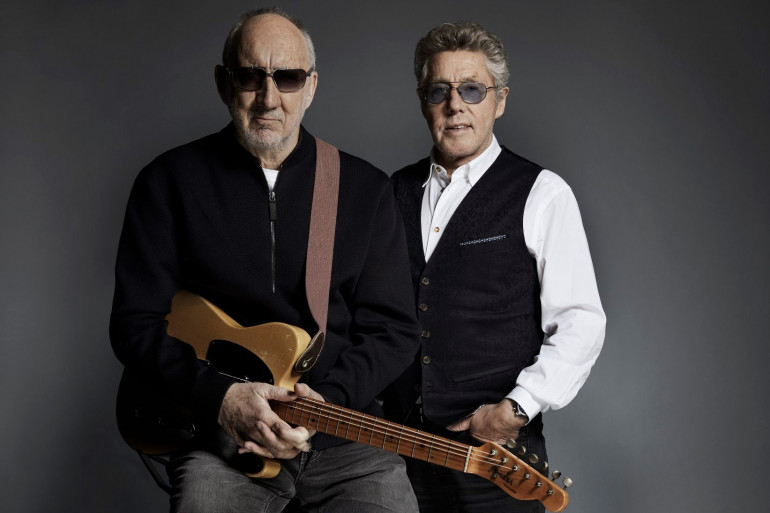
In 1965, Paul McCartney said the Who "are the most exciting thing around" and was inspired to write "Helter Skelter" in the group's "heavy" style; John Lennon borrowed the acoustic guitar style in "Pinball Wizard" for "Polythene Pam".
The loud volume of the band's live show influenced the approach of Hard rock and Heavy metal. Proto punk and Punk rock bands such as the MC5, The Stooges, the Ramones the Sex Pistols, The Clash and Green Day cite the Who as an influence. An early influence on Queen, guitarist Brian May referred to the Who as being "among our favourite groups". The Who inspired Mod revival bands, particularly The Jam, which helped other groups influenced by the Who become popular. The Who influenced hard rock bands such as Guns N' Roses. In the mid-1990s, Britpop bands such as Blur and Oasis were influenced by the Who. The Who have also influenced Pop punk band Panic! at the Disco.
The Who have inspired many tribute bands; Roger Daltrey has endorsed The Whodlums, who raise money for the Teenage Cancer Trust. Many bands have covered Who songs; Elton John's version of "Pinball Wizard" reached No. 7 in the UK.
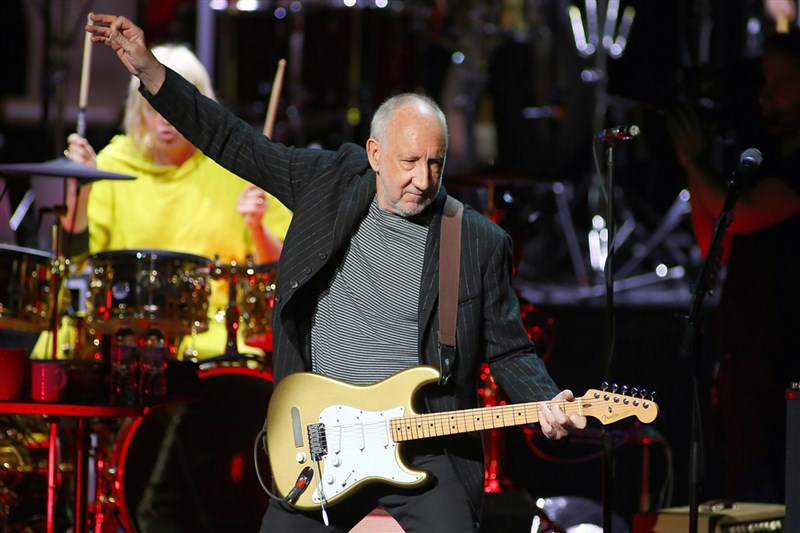
Media
During the Who's hiatuses in the 1980s and 90s, Pete Townshend developed his skills as a music publisher to be financially successful from the Who without recording or touring. He countered criticism of "selling out" by saying that licensing the songs to other media allows a wider exposure and widens the group's appeal. The American forensic drama CSI (CSI: Crime Scene Investigation, CSI: Miami, CSI: NY, CSI: Cyber and CSI: Vegas) feature Who songs as theme music, "Who Are You", "Won't Get Fooled Again", "Baba O'Riley" and "I Can See for Miles" respectively.
The group's songs have featured in other popular TV series such as The Simpsons, and Top Gear, which had an episode where the presenters were tasked with being roadies for the band. Rock-oriented films such as Almost Famous, School of Rock and Tenacious D in the Pick of Destiny refer to the band and feature their songs, and other films have used the band's material in their soundtracks, including Apollo 13 (which used "I Can See For Miles") and Austin Powers: The Spy Who Shagged Me (which used a take of "My Generation" recorded for the BBC).
Several of the band's tracks have appeared in the video game Rock Band and its sequels. The New York Times Magazine has listed The Who among hundreds of artists whose material was reportedly destroyed in the 2008 Universal fire.
Awards and nominations
The Who have received many awards and accolades from the music industry for their recordings and their influence. They received a Lifetime Achievement Award from the British Phonographic Industry in 1988, and from the Grammy Foundation in 2001.
The band were inducted into the Rock and Roll Hall of Fame in 1990 where their display describes them as "prime contenders, in the minds of many, for the title of World's Greatest Rock Band", and the UK Music Hall of Fame in 2005.
In 2003, Rolling Stone's 500 Greatest Albums of All Time list included Who's Next at number 28, Tommy at number 96, The Who Sell Out at number 113, Live at Leeds at number 170, My Generation at number 236, Quadrophenia at number 266, and A Quick One at number 383. And in 2004, on their 500 Greatest Songs of All Time list, Rolling Stone included "My Generation" at number 11, "Won't Get Fooled Again" at number 133, "I Can See for Miles" at number 258, "Baba O'Riley" at number 340, and "I Can't Explain" at number 371. They are ranked the 29th greatest artist of all time by Rolling Stone magazine, and the same magazine ranked Pete Townshend among the greatest songwriters.
The single "My Generation" and the albums Tommy and Who's Next have each been inducted into the Grammy Hall of Fame. In 2008, Pete Townshend and Roger Daltrey received Kennedy Center Honors as members of the Who. In 2009, My Generation was selected for preservation in the United States National Recording Registry.
Albums
My Generation (1965)
A Quick One (1966)
The Who Sell Out (1967)
Tommy (1969)
Who's Next (1971)
Quadrophenia (1973)
The Who by Numbers (1975)
Who Are You (1978)
Face Dances (1981)
It's Hard (1982)
Endless Wire (2006)
Who (2019)
Members
Roger Daltrey – lead and backing vocals, rhythm guitar, harmonica, percussion (1964–1983, 1985, 1988, 1989, 1996–present)
Pete Townshend – lead and rhythm guitar, backing and lead vocals, keyboards (1964–1983, 1985, 1988, 1989, 1996–present)
Touring members
Billy Nicholls – backing vocals (1989, 1996–1997, 2019–present)
Zak Starkey – drums, percussion (1996–present)
Simon Townshend – guitar, backing vocals (1996–1997, 2002–present)
Loren Gold – keyboards, backing vocals (2012–present)
Jon Button – bass guitar (2017–present)
Keith Levenson - music coordinator, conductor (2019-present)
Katie Jacoby - lead violinist (2019-present)
Audrey Q. Snyder - lead cellist (2019-present)
Emily Marshall - keyboards, associate conductor (2019-present)
Former members
John Entwistle – bass guitar, horns, backing and lead vocals (1964–1983, 1985, 1988, 1989, 1996–2002; died 2002)
Keith Moon – drums, backing and lead vocals (1964–1978; died 1978)
Doug Sandom – drums (1964; died 2019)
Kenney Jones – drums (1978–1983, 1985, 1988, 2014)
Former touring members
John Bundrick – keyboards (1979–1981, 1985, 1988, 1989, 1996–2011)
Simon Phillips – drums (1989)
Steve Bolton – guitar (1989)
Pino Palladino – bass guitar (2002–2017)
John Corey – keyboards, backing vocals (2012–2017)
Frank Simes – keyboards, mandolin, banjo, percussion, backing vocals, musical director (2012–2017)
Source: Wikipedia

